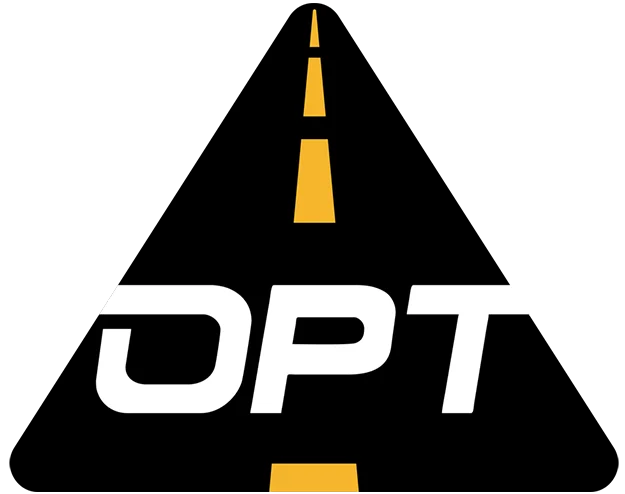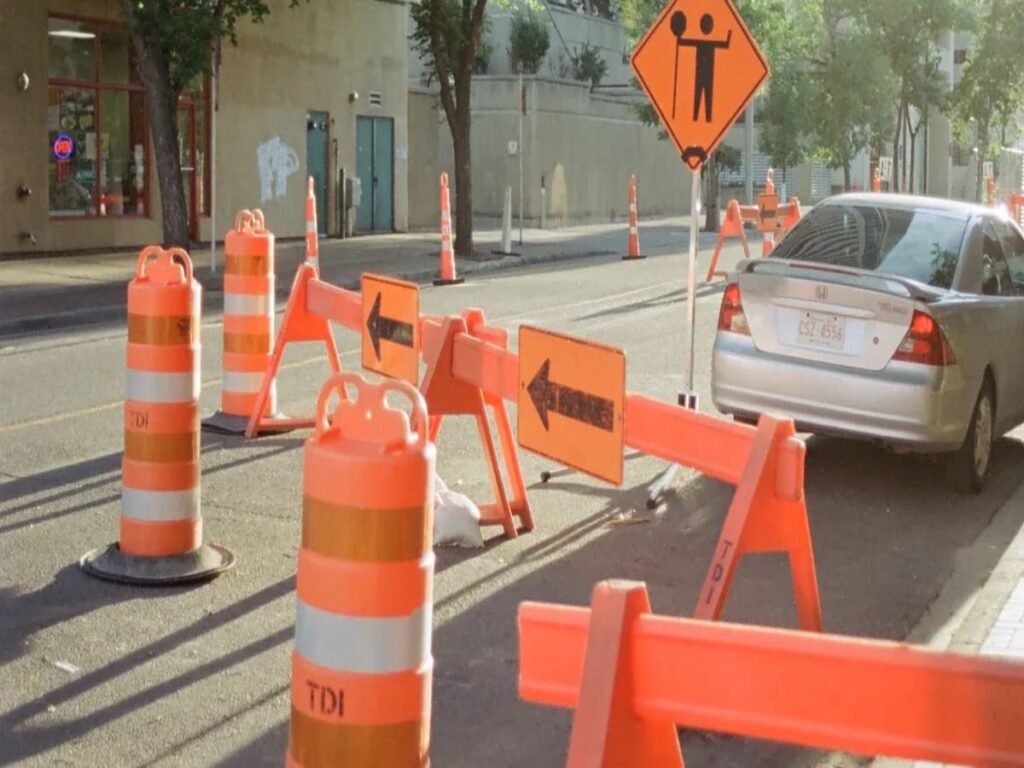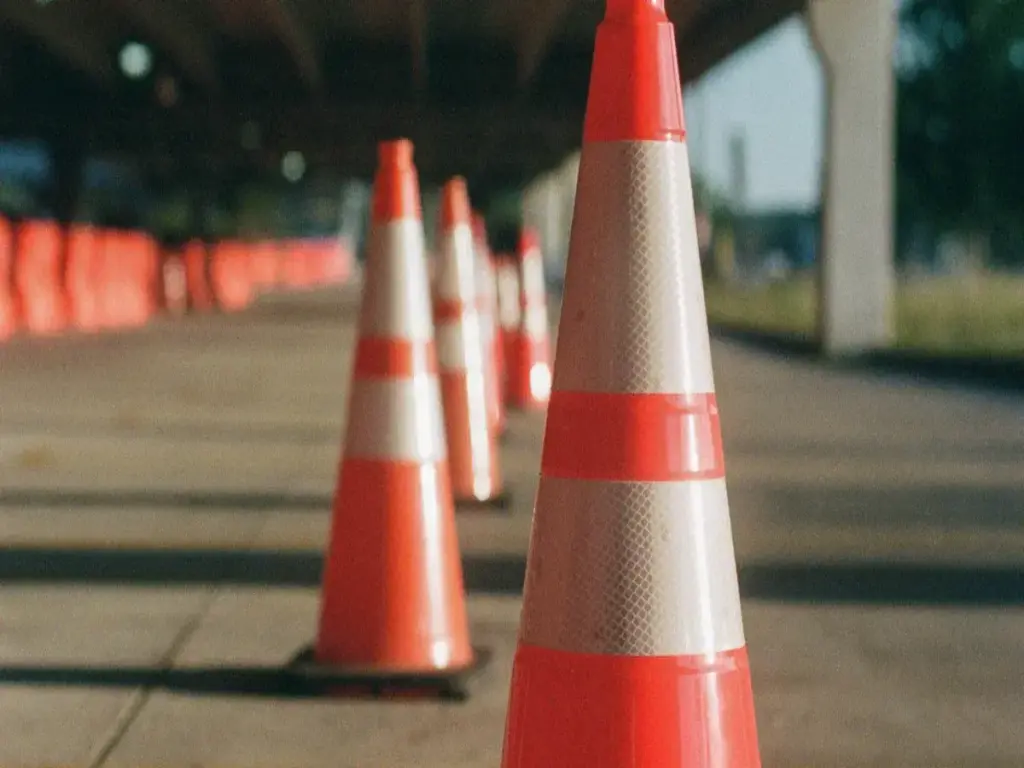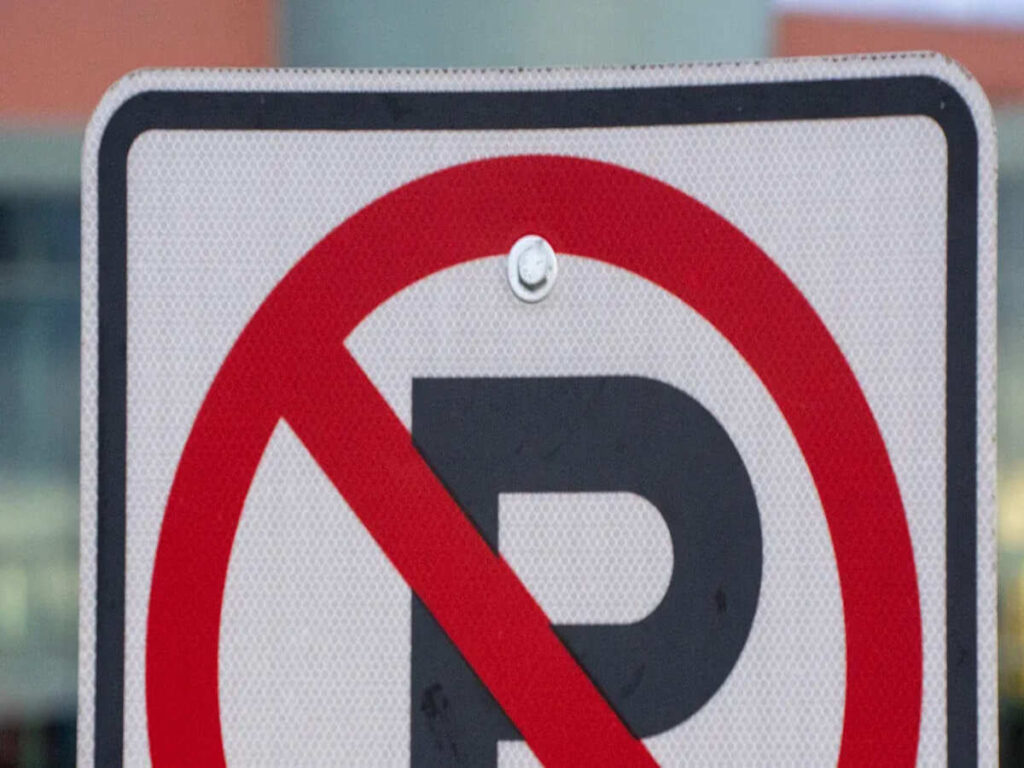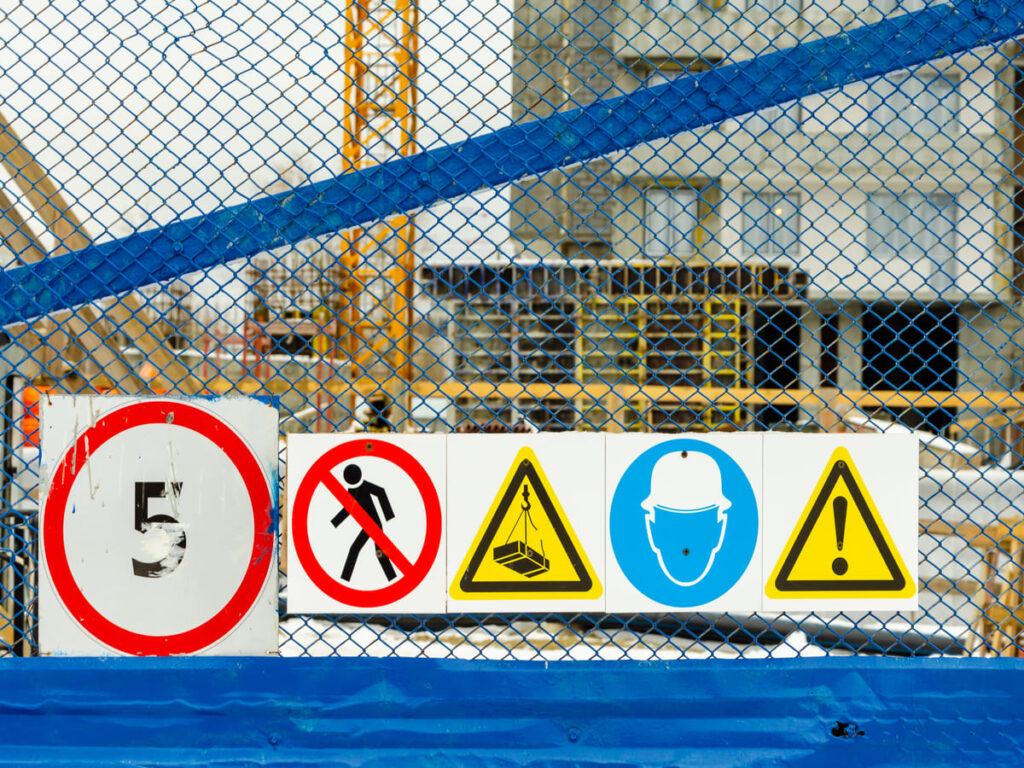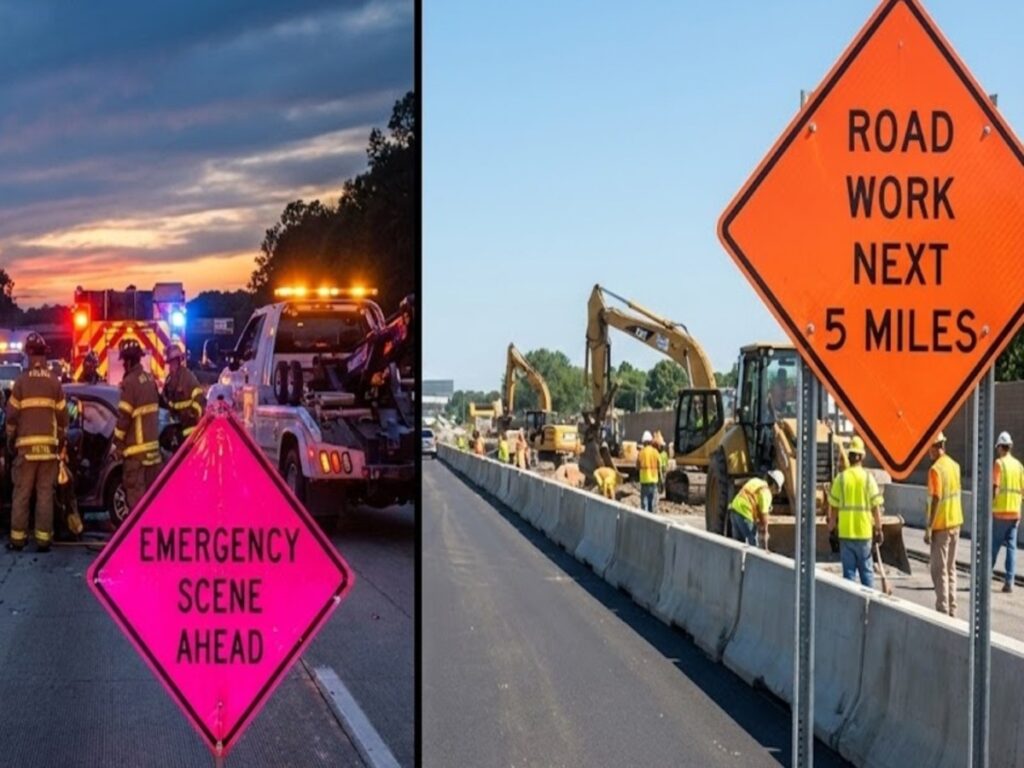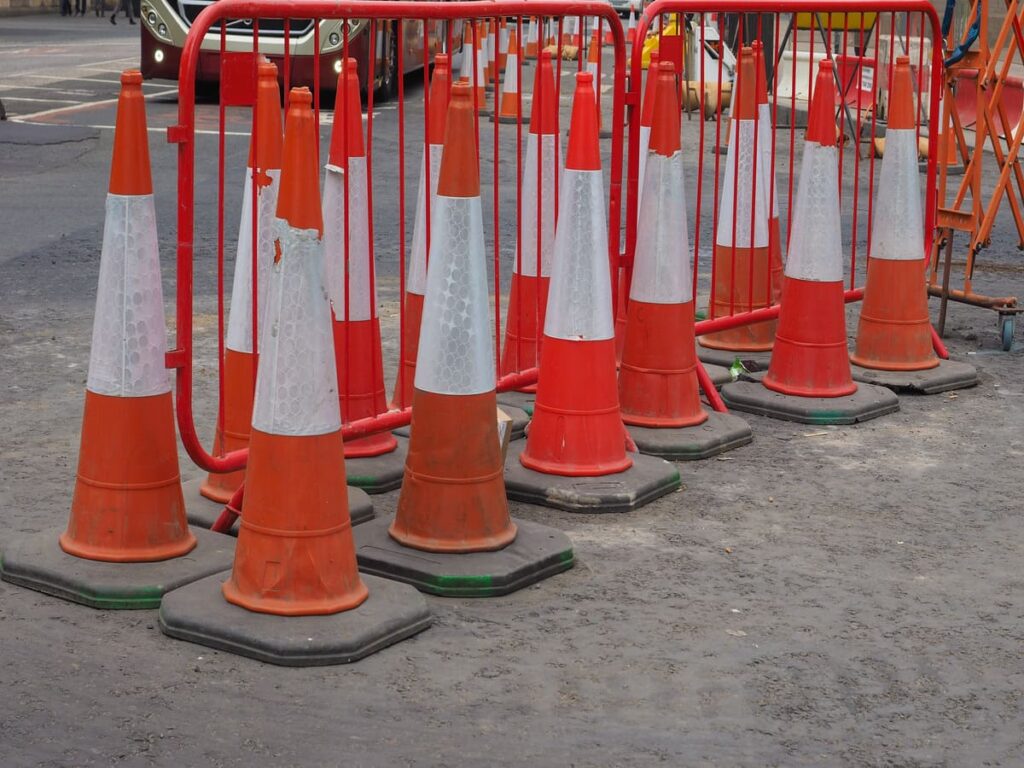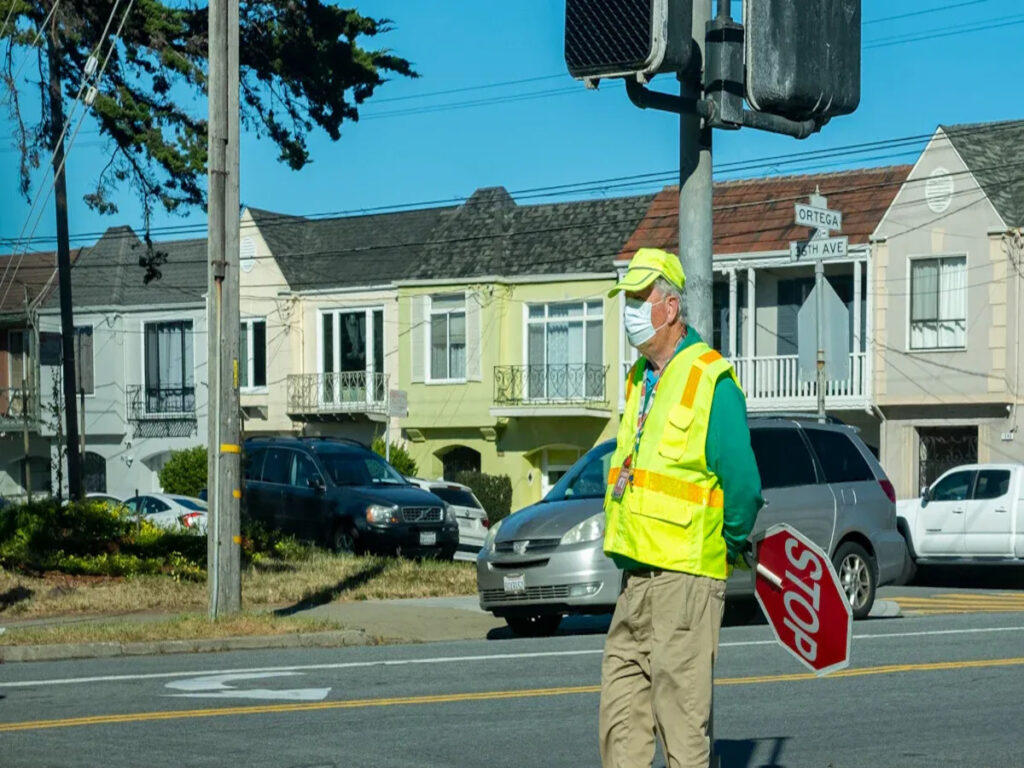
Vous voyez un passage à niveau dans un gilet brillant, se tenir à une intersection d'école animée. Le garde tient des panneaux d'arrêt maintenus main, indiquant clairement que vous devez arrêter. Ces panneaux aident à assurer la sécurité des enfants tout en traversant la rue près de l'école. Lorsque vous remarquez un passage à niveau en service, Vous savez que votre arrêt aide à protéger tout le monde pendant l'arrivée de l'école et les temps de licenciement. La sécurité commence par votre attention à chaque traversée.
Pour soutenir des passages sûrs, Optraffic offre une haute visibilité, durable Signes d'arrêt de poche Conçu pour les gardes-traversées. Nos panneaux de signalisation à vendre sont fabriqués pour une visibilité maximale et une facilité d'utilisation, S'assurer que les gardes du passage. Avec fiable, Matériaux résistants aux intempéries, Les panneaux d'arrêt portables d'Optraffic sont construits pour durer et sont un outil essentiel pour la sécurité scolaire. Explorez nos produits et équipez vos gardes de traverse des meilleurs équipements de sécurité disponibles.
Signes d'arrêt à main pour les gardes à travers
Définition et fonctionnalités
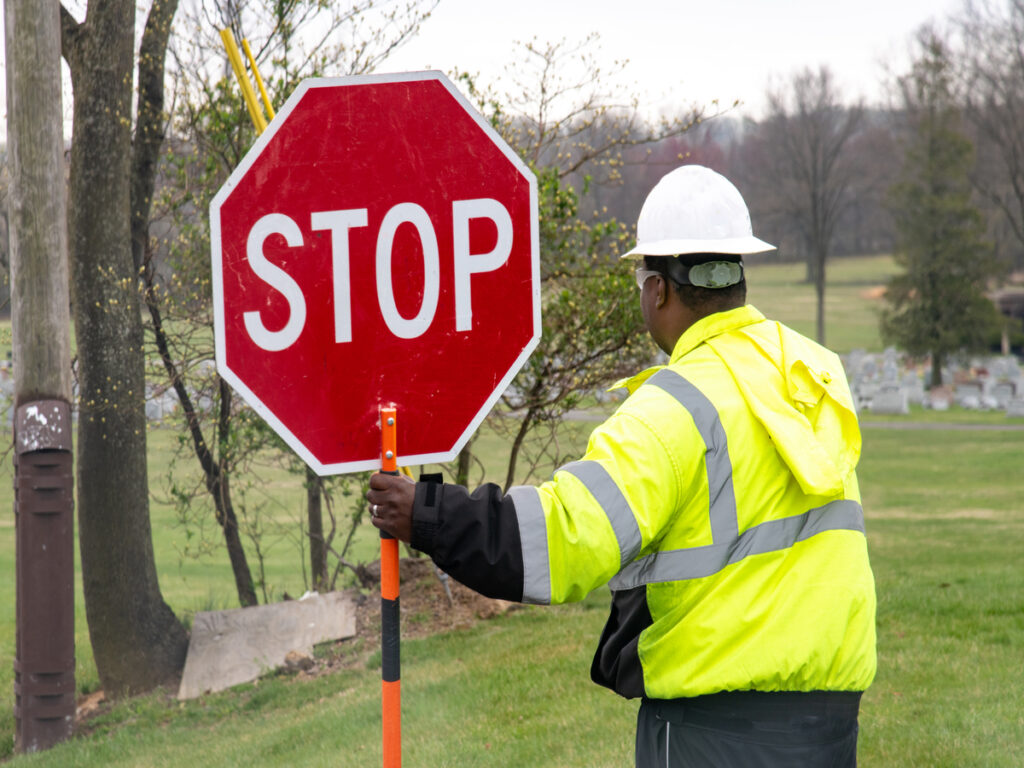
Lorsque vous apercevez un traverse avec un panneau d'arrêt à main, Vous voyez ses couleurs vives et sa forme spéciale. Le signe a toujours huit côtés et montre un fond rouge avec des lettres blanches. Cela suit Règles Mutcd. La forme vous aide à savoir que c'est un panneau d'arrêt tout de suite. La plupart des panneaux d'arrêt ont deux côtés. Un côté dit “ARRÊT” Et l'autre dit “LENT.” Les gardes du passage. Ces matériaux ne rouillent pas, ébrécher, ou crack. Le panneau reste bien même lorsqu'il est utilisé tous les jours.
Beaucoup Signes d'arrêt avoir brillant, couvertures réfléchissantes. Certains utilisent un grade prismatique 3M pour que vous puissiez les voir dans l'obscurité ou la pluie. Certains panneaux de trafic ont des lumières LED dans les lettres. Les lumières peuvent cligner des yeux ou rester sur. Vous pouvez voir ces lumières de loin, Même plus d'un mile. La poignée a souvent de la mousse douce et une sangle de poignet. Cela rend facile et sûr. Les panneaux sont disponibles en différentes tailles, comme 12″x12″ ou 18″x18″. Ils sont légers, Donc, les gardes de traverse ne sont pas fatigués les tenir.
| Fonctionnalité / Matériel | Description |
|---|---|
| Matériau réfléchissant | 3M Grade d'intensité à haute |
| Éclairage LED | Jusqu'à 52 LED par côté, visible jusqu'à 1 mile |
| Manipuler | Poignée en mousse, bracelet de poignet |
| Poids | Léger, 1.2–2.1 lbs |
| Type de batterie | Lithium-ion rechargeable, Sauvegarde incluse |
| Options de taille | 12″x12″, 18″x18″ |
| Conformité | Répond aux normes Mutcd |
But et utilisation
Les panneaux d'arrêt à main aident à garder les zones scolaires et les rues animées en sécurité. Les gardes de traverse utilisent ces panneaux pour donner des instructions claires aux conducteurs et aux gens qui marchent. Le panneau d'arrêt indique aux conducteurs d'arrêter. Cela permet aux enfants et à d'autres traverser la rue en toute sécurité. Les couleurs vives, couvertures brillantes, et les lumières LED rendent le signe facile à voir. Vous pouvez le repérer la nuit ou sous la pluie. Cela aide à arrêter les accidents et protège tout le monde.
Crossing Guards Pick Hand Tensid Stop Signes car ils sont faciles à transporter et à utiliser. Le panneau de circulation routière aide les gardes à contrôler les grands groupes de personnes pendant les temps scolaires chargés. Quand tu vois le signe, tu sais arrêter. Cela maintient le trafic en ordre. Le signe et l'équipement de sécurité du Guard s'assurent que les conducteurs font attention et écoutent. En utilisant des panneaux d'arrêt à main, Crossing Guards Gardez les enfants en sécurité et aidez tout le monde près des écoles et des rues animées.
Exigences légales pour s'arrêter pour la traversée
Lois et autorités des États
Lorsque vous conduisez près d'une école, Vous devez toujours surveiller un passage à niveau. La loi dit que vous devez vous arrêter lorsqu'un passage de traverse tient un panneau d'arrêt. Cette règle s'applique même si un feu de circulation montre vert ou si vous ne voyez pas les enfants tout de suite. Le Crossing Guard utilise des panneaux d'arrêt à main pour contrôler la circulation et protéger tout le monde traversant la rue.
De nombreux États ont des lois claires à ce sujet. Par exemple, La loi de Virginia vous oblige à obéir aux signaux d'un garde-traverse qui utilise un panneau d'arrêt à main. En Californie, La loi affirme que les chauffeurs d'autobus scolaires doivent agir comme des gardes à traverser les élèves de la maternelle à la 8e année. Ils doivent tenir un panneau d'arrêt et aider les enfants à traverser en toute sécurité. La loi de l'Arizona vous oblige également à vous arrêter pour quiconque dans un passage pour piétons de la zone scolaire, y compris une traverse, Et attendez que toutes les personnes aient fini de traverser.
Les gardes de traverse ont une autorité spéciale. Ils portent des uniformes et utilisent des équipements de sécurité lumineux pour que vous puissiez les voir. Ils ont le pouvoir de diriger la circulation aux passages à niveau et d'autres endroits animés. Vous devez obéir à leurs signaux et ordres. Si vous ne le faites pas, Vous enfreignez la loi.
Voici une table qui montre ce que les gardes de traverse peuvent faire et ce que vous devez faire en tant que chauffeur:
| Aspect | Description |
|---|---|
| Nomination et identification | Les gardes de traverse sont nommés et doivent porter des uniformes pour une identification facile. |
| Autorité de diriger le trafic | Les gardes peuvent diriger la circulation à l'école et les passages à niveau des églises. |
| Énergie pour contrôler le trafic | Les gardes peuvent signaler, arrêt, ou des véhicules directs pour assurer la sécurité des enfants. |
| Obligation légale des conducteurs | Vous devez obéir à tous les signaux ou ordres légaux d'un garde-travers. |
Conseil: Recherchez toujours le panneau et l'uniforme du Crossing Guard. Quand tu vois le signe d'arrêt, Arrêtez votre voiture et attendez que le gardien baisse le panneau et tout le monde s'est croisé.
Pénalités pour ne pas s'arrêter
Si vous ne vous arrêtez pas pour un traverse, Vous faites face à de graves pénalités. Chaque État a ses propres règles, Mais le message est le même: Vous devez obéir au panneau d'arrêt et aux instructions du passage à niveau.
En Californie, Ne pas obéir à un passage à niveau est une infraction. Vous paierez une amende au moins $284. L'État ajoute un point à votre dossier de conduite. Vous devez vous arrêter et suivre toutes les commandes du Crossing Guard. La création d'un contact visuel avec la garde vous aide à montrer que vous faites attention et prêt à obéir.
D'autres États ont des sanctions encore plus fortes. Au Nevada, Ne pas s'arrêter pour un passage à niveau scolaire est un délit. Tu pourrais payer $1,000 en amendes, dépenser jusqu'à 6 mois de prison, ou faire un service communautaire. Si vous frappez quelqu'un en enfreignant cette loi, Les amendes et les heures de service augmentent. Vous obtenez aussi 4 Points sur votre licence. Si vous obtenez 12 points en un an, Vous pourriez perdre votre licence.
Certaines villes, Comme Madison, vous oblige à vous arrêter au moins 10 pieds du passage du passage et pas plus que 30 pieds de distance. Vous ne pouvez y aller lorsque le garde et tout le monde ont fini de traverser et le panneau d'arrêt est en panne.
Ne pas s'arrêter pour un Crossing Guard peut également vous coûter plus d'argent au fil du temps. Les compagnies d'assurance voient cela comme une conduite risquée. Vos tarifs d'assurance peuvent augmenter par 26% à 31% Dans certains États. Dans d'autres, L'augmentation est plus petite mais toujours coûteuse. Certains États ajoutent des frais supplémentaires pendant plusieurs années.
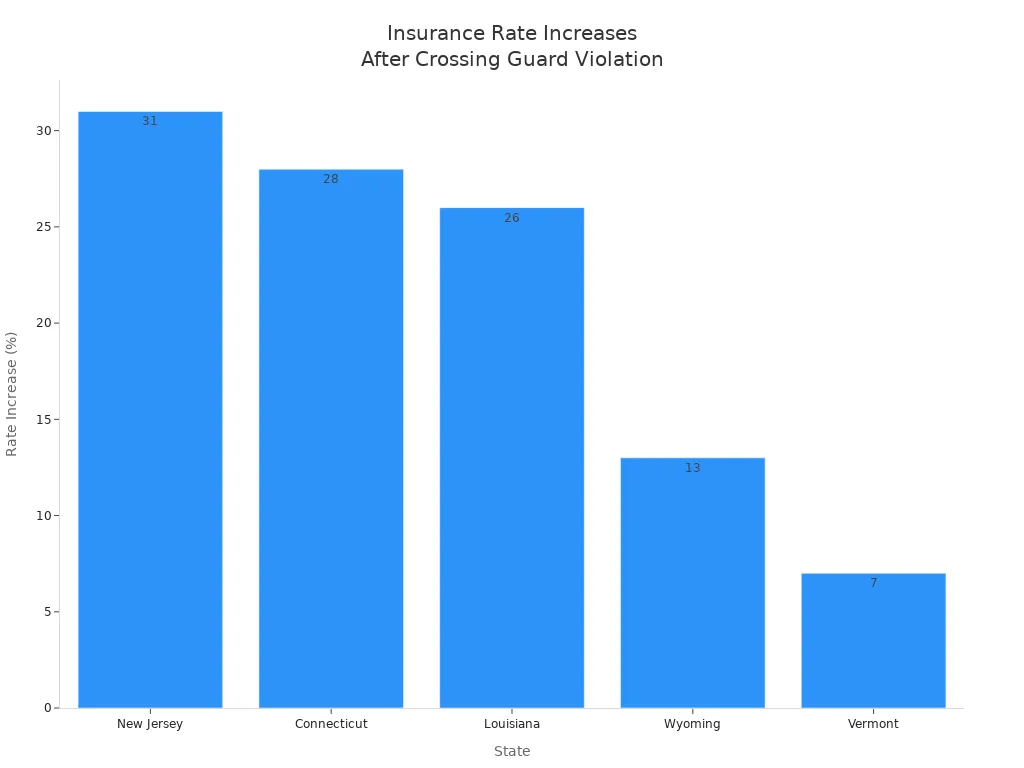
Voici une liste des pénalités possibles auxquelles vous pourriez faire face si vous ne vous arrêtez pas pour un Crossing Guard:
- Amendes de $284 à $2,000, selon l'État et si un accident se produit
- Points ajoutés à votre dossier de conduite (1 à 4 points)
- Taux d'assurance plus élevés pendant plusieurs années
- Persono prison ou service communautaire dans certains États
- Risque de perdre votre licence si vous obtenez trop de points
Note: S'arrête toujours pour le panneau d'arrêt du Crossing Guard. Obéissez à leurs instructions chaque fois que vous conduisez près d'une école. Cela protège les enfants et protège votre emprise.
Quand les conducteurs doivent s'arrêter pour les collèges scolaires
Zones scolaires
Lorsque vous conduisez près d'une école pendant les heures de gamme, Vous remarquez un passage à niveau entrant dans la rue avec un panneau d'arrêt surélevé. Vous devez immédiatement arrêter votre voiture. Le Crossing Guard se positionne dans le passage pour piétons, vous signalant d'attendre pendant qu'ils aident les enfants à traverser en toute sécurité. Ne procédez pas tant que le passage du passage à niveau abaisse le panneau d'arrêt et sort de la rue.
Crossing-gardiens scolaires Assurer la sécurité dans les zones scolaires pendant les heures du matin et de l'après-midi. Ils sont stationnés à des passages pour piétons marqués, Entrées de l'école, et intersections occupées. Les conducteurs doivent s'arrêter indépendamment d'un feu vert, Comme le panneau d'arrêt du Crossing Guard a priorité. Suivre les signaux du garde est essentiel pour protéger les enfants et autres piétons.
Quand vous voyez des feux rouges clignotants sur un bus scolaire près d'une école, Arrêtez au moins 20 pieds de distance. Attendez alors que le bras d'arrêt s'étend et que les enfants traversent la route sous la supervision du Crossing Guard. Ne procédez pas tant que le bus éteint ses lumières et que le passage du passage vous indique de déplacer.
Conseil: Recherchez toujours les gardes-passagers et arrêtez les panneaux dans les zones scolaires. Vous aidez à assurer la sécurité des enfants lorsque vous vous arrêtez et attendez que le signal continue.
Voici un guide rapide pour s'arrêter dans les zones scolaires:
| Situation | Ce que tu devrais faire |
|---|---|
| Crossing Guard Pass dans les passages intermédiaires | S'arrêter immédiatement |
| Arrêtez le panneau Rendu | Rester arrêté jusqu'à ce que le panneau soit abaissé |
| Bus scolaire avec des lumières clignotantes | Arrêtez au moins 20 pieds de distance |
| Enfants traversant | Attendez que tout soit croisé |
Autres emplacements de passage
Conduire dans un parc un week-end, Vous remarquez un passage à niveau aidant les familles de l'autre côté de la rue pour un événement spécial. Dès que le Crossing Guard soulève le panneau d'arrêt, Vous arrêtez rapidement votre voiture. Vous attendez patiemment que tout le monde traverse, même si les enfants ne sont pas immédiatement visibles.
Les gardes de traverse scolaire ne se limitent pas aux zones scolaires; Ils opèrent également dans les parcs, zones de construction, Et lors d'événements communautaires. Arrêtez-vous toujours pour les gardes à traverser tout passage pour piétons, Qu'il soit marqué ou non marqué. Suivez leur panneau d'arrêt et attendez leur signal avant de continuer.
Sur une chaussée indivise, Lorsqu'un autobus scolaire s'arrête avec des lumières clignotantes et qu'un passage à niveau sort sort, vous devez arrêter votre voiture quelle que soit votre voie. Sur une chaussée divisée, Vous devez vous arrêter uniquement si vous voyagez dans le même sens que le bus. Observer comme le passage du passage à niveau assiste en toute sécurité les enfants traversant la route.
Près d'un chantier de construction par une école, Un garde-traverse gère le flux de travailleurs et d'enfants traversant la rue. Faire une pause pour observer, vous attendez le signal du garde, Assurer le passage pour piétons. Restant stationnaire, vous procédez uniquement lorsque le panneau d'arrêt est abaissé, Et le garde indique qu'il est sûr de bouger.
Note: Vous devez vous arrêter pour les gardes à travers n'importe quel endroit où les gens traversent la rue. Vous aidez à prévenir les accidents et à protéger tout le monde dans votre communauté.
Vous trouvez des gardes à travers les écoles à de nombreux endroits:
- Zones scolaires
- Parcs et terrains de jeux
- Zones de construction près des écoles
- Événements communautaires avec un trafic piétonnier
- Crossins d'église pendant les périodes occupées
Arrêtez toujours quand un passage de traverse soulève un panneau d'arrêt. Restez arrêté jusqu'à ce que le garde baisse le signe et vous signale pour continuer. Suivre ces règles assure la sécurité des enfants et d'autres piétons.
Meilleures pratiques pour les conducteurs et les gardes à travers
Distance d'arrêt en toute sécurité
Vous jouez un rôle clé dans la sécurité des zones scolaires. Quand vous voyez des cartes de traverse scolaire avec un panneau d'arrêt, tu devrais toujours arrêter ta voiture au moins 10 pieds du passage pour piétons. Cette distance donne aux enfants et aux adultes suffisamment d'espace pour traverser en toute sécurité. Ne bloquez jamais le passage pour piétons ou avancez jusqu'à ce que le Crossing Guard baisse le panneau et quitte la rue. Si vous vous arrêtez trop près, Vous mettez à la fois le Crossing Guard et les piétons en danger.
Conseil: Toujours ralentir lorsque vous approchez d'une école. Surveillez les gardes à traverser et soyez prêt à s'arrêter, Même si vous ne voyez pas les enfants tout de suite.
Vous aidez à améliorer la sécurité des piétons en suivant ces étapes simples:
- Surveillez les gardes-passage à niveau scolaire dans des gilets brillants.
- S'arrêter complètement lorsque le garde soulève le panneau d'arrêt.
- Rester patient jusqu'à ce que tout le monde ait fini de traverser.
Conformité et communication
Vous devez toujours obéir aux instructions des gardes de traverse scolaire. Leurs instructions sont prioritaires sur les feux de circulation ou les panneaux. En suivant leurs signaux, Vous aidez à prévenir les accidents et à soutenir la sécurité pour tout le monde près de l'école.
Voici quelques meilleures pratiques pour les conducteurs:
- Reconnaissez que les gardes-traversés sont formés pour protéger les enfants et gérer le trafic.
- Ralentissez dans les zones scolaires et préparez-vous à s'arrêter lorsque vous voyez un passage à niveau.
- Attendez que le Crossing Guard signale qu'il est sûr d'aller.
Les gardes-traversées suivent également d'importantes étapes de sécurité pour protéger elles-mêmes et les autres:
- Portez des gilets de sécurité haute visibilité et utilisez des palettes d'arrêt standard avec des caractéristiques réfléchissantes ou LED.
- Choisissez des moments sûrs pour entrer dans la rue et créer des lacunes dans la circulation pour traverser.
- Restez vigilant et restez sur la route uniquement lorsqu'il est sûr.
- Utiliser Clear, signaux confiants pour diriger les conducteurs et les piétons.
Note: Une bonne communication entre les conducteurs et les gardes de traverse assure la sécurité des zones scolaires. Vous aidez à créer une communauté plus sûre chaque fois que vous suivez ces meilleures pratiques.
Comment les panneaux d'arrêt à main améliorer la sécurité
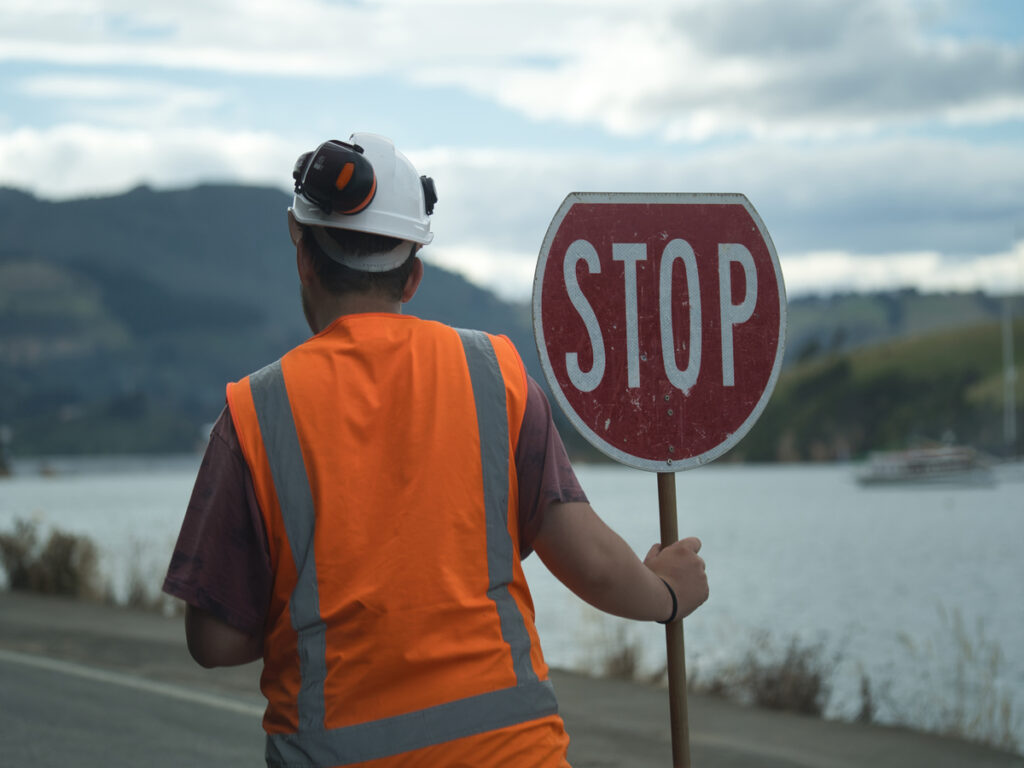
Visibilité et contrôle
Vous devez voir clairement un panneau d'arrêt, Même par mauvais temps ou la nuit. Les panneaux d'arrêt à main utilisent des matériaux réfléchissants spéciaux et des lumières LED pour vous assurer de les remarquer immédiatement. Ces fonctionnalités vous aident à repérer le signe de loin, Vous avez donc le temps de ralentir et de vous arrêter.
- Feuille de réflexion, comme 3Grade d'ingénieur M®, rebondit la lumière de vos phares vers vos yeux. Cela rend le panneau d'arrêt facile à voir sous différents angles et longues distances.
- Lumières LED briller, Même dans le brouillard, pluie, ou l'obscurité. Certains signes ont jusqu'à 52 LEDS et peut être vue à un mile de distance. Les lumières peuvent clignoter ou rester solides, Attirer votre attention rapidement.
- Les matériaux utilisés dans ces signes résistent aux dommages causés par les intempéries et le soleil. Cela signifie que le panneau reste brillant et clair, Garder la sécurité élevée toute l'année.
- La technologie LED utilise peu d'énergie et fonctionne souvent sur l'énergie solaire. Cela fait fonctionner le signe avec moins de besoin de réparations.
Quand vous voyez un passage à niveau tenant un brillant, signe d'arrêt brillant, Vous savez s'arrêter et laisser les enfants traverser en toute sécurité. Le signal clair vous aide à suivre les règles et à faire avancer le trafic de manière ordonnée.
Prévention des accidents
Les panneaux d'arrêt à main font plus que simplement vous dire d'arrêter. Ils aident à prévenir les accidents et à protéger tout le monde près du passage pour piétons. La conception et les caractéristiques de ces signes font une grande différence de sécurité pour les enfants et autres piétons.
| Fonctionnalité / aspect | Contribution à la prévention des accidents |
|---|---|
| Haute visibilité | Les conducteurs voient le panneau d'arrêt tôt et ont le temps de réagir. |
| Léger et portable | Les gardes de traverse peuvent se déplacer et utiliser facilement le signe, Garder la zone en sécurité pour les enfants. |
| Système de ressort réactif | Le panneau reste fort et visible, Même s'il est cogné par une voiture. |
| Marquage de passage pour piétons | Les conducteurs savent exactement où s'arrêter et céder aux piétons. |
| Changement de comportement éprouvé | Les études montrent que les conducteurs ralentissent et s'arrêtent plus souvent quand ils voient ces signes, Abaisser le risque d'accident. |
Lorsque vous voyez un panneau d'arrêt avec des lumières vives et des surfaces réfléchissantes, Vous faites plus d'attention. L'autorité du panneau et le message clair vous rendent plus susceptible de vous arrêter et d'attendre. Cette action simple aide à prévenir les blessures et sauve des vies. Vous aidez à assurer la sécurité de votre communauté chaque fois que vous suivez le signal du passage à niveau.
Les gardes-traversées et les panneaux d'arrêt à main aident à garder les écoles en sécurité. Lorsque vous vous arrêtez pour un traverse, Vous aidez à protéger les enfants de se blesser. Cela protège également les enfants près de l'école. Des études montrent que les écoles avec des gardes-traversées subissent moins de blessures. Les étudiants apprennent également de meilleures habitudes de sécurité. Des programmes comme les itinéraires sûrs vers l'école ont vu des blessures aux enfants baisser de moitié. Vous pouvez aider votre école en demandant, Signes d'arrêt de maintien à la main réfléchis. Ces panneaux durent longtemps et restent brillants, Même par mauvais temps.
| Avantage | Impact sur la sécurité scolaire |
|---|---|
| Moins de blessures | Crossins plus sûrs près de chaque école |
| Meilleure visibilité | Les conducteurs voient des panneaux de loin |
| Matériaux durables | Les panneaux protègent les étudiants année après année |
Chaque fois que vous vous arrêtez pour un passage à niveau dans votre école, Vous aidez à rendre la route plus sûre pour tout le monde.
FAQ
Quand avez-vous besoin de vous arrêter pour un passage à niveau avec un panneau d'arrêt à main?
Vous devez vous arrêter chaque fois qu'une traverse soulève un panneau d'arrêt à main. Attendez que le garde baisse le signe et quitte le passage pour piétons. Cette règle s'applique dans les zones scolaires, parcs, Et lors d'événements spéciaux.
Pouvez-vous y aller si le feu de circulation est vert mais que le passage du passage à niveau tient un panneau d'arrêt?
Vous devez obéir au panneau d'arrêt du Crossing Guard, Même si le feu de circulation est vert. Le signal du Garde a toujours la priorité. Arrêtez et attendez que le garde vous signale pour continuer.
Que se passe-t-il si vous ne vous arrêtez pas pour une traverse?
Vous pouvez faire face à des amendes, Points sur votre licence, et des taux d'assurance plus élevés. Certains États peuvent avoir besoin d'un service communautaire ou même d'une peine de prison. Arrêtez toujours pour garder tout le monde en sécurité.
Jusqu'où devez-vous vous arrêter à un passage à niveau?
Tu devrais arrêter au moins 10 pieds de la traverse. Cette distance donne aux enfants et aux adultes suffisamment d'espace pour traverser en toute sécurité. Ne bloquez jamais le passage pour piétons.
Pourquoi les gardes de traversée utilisent-ils des panneaux d'arrêt à main au lieu des panneaux de circulation réguliers?
Les panneaux d'arrêt à main donnent aux gardes du passage à travers. Les panneaux sont portables, brillant, et facile à voir. Les gardes les utilisent pour protéger les enfants et gérer les passages occupés.
